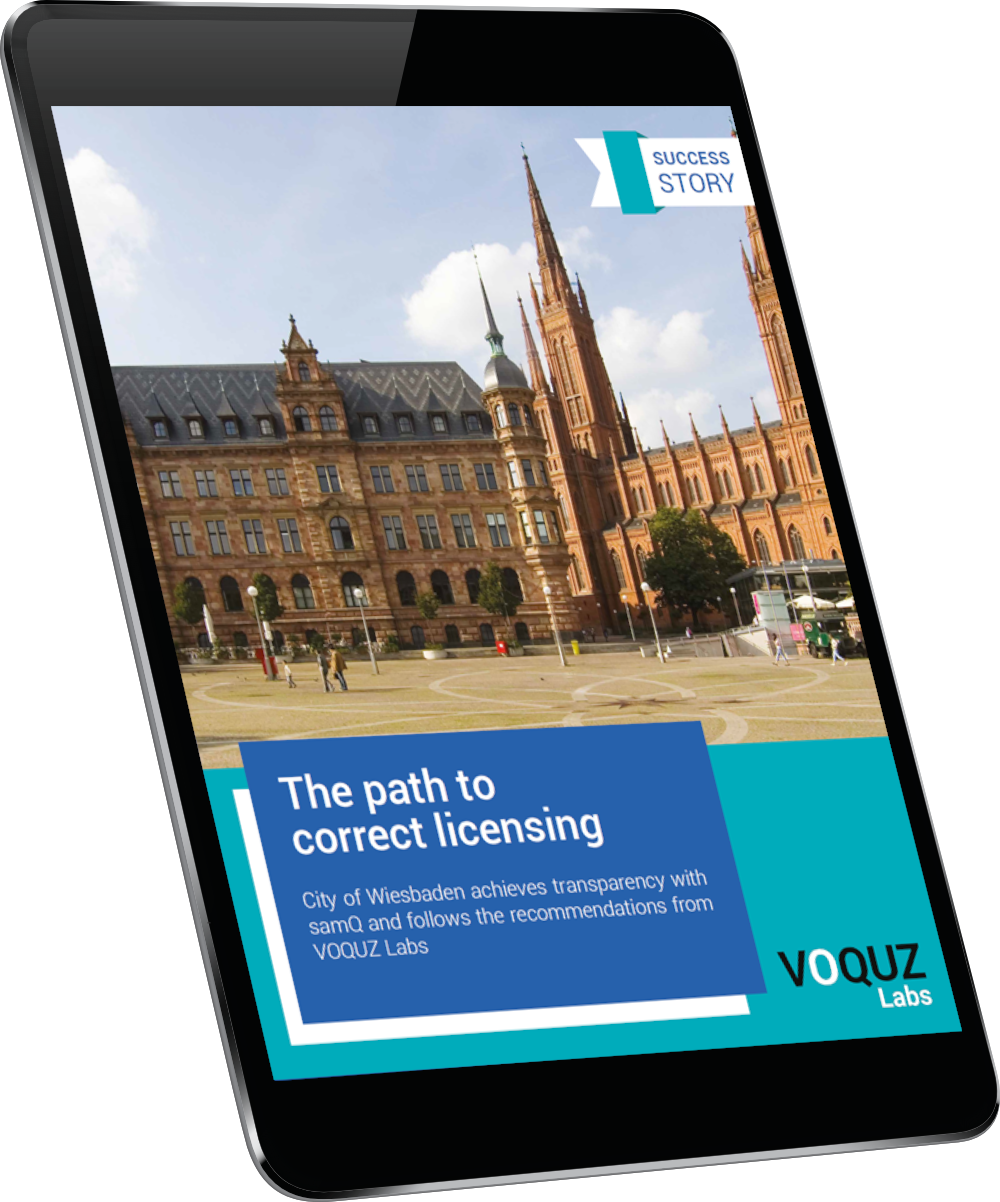REFERENCES
City of Wiesbaden – The Path to correct Licensing
The City of Wiesbaden is the state capital of Hessen and has a population of approximately 280,000. The around 4,000 staff in the various administrative departments work in roughly 200 locations throughout the metropolitan area. These include typical administrative units, as well as schools, nurseries, and many social service providers. A total of about 850 staff work with SAP. The system is maintained by a central SAP Centre of Excellence within the city.
Manfred Laufer (Assistant Director of the SAP Centre of Excellence) became aware of samQ in January 2019 whilst participating in a partner webinar with WMD. The topic was: “How to master indirect usage: SAP licensing explained using the example of WMD’s invoice workflow”. At this point, the city of Wiesbaden had open questions about how to correctly license SAP users. This was followed by the first contact with VOQUZ Labs.
VOQUZ Labs: What was your goal for implementing an SAP license management tool?
Manfred Laufer: We wanted to ensure that users only received the licenses they really needed. We also wanted to eliminate ambiguities in contract negotiations with SAP and explore options for change. SAP S/4HANA® was being discussed and we thought that exchanging licenses might be a possibility. Avoiding license shortages was another objective. Last but not least, we decided it was important to check our current SAP activity for cases of indirect usage.
VOQUZ Labs: What was the situation like before? How were SAP licences managed previously?
Manfred Laufer: Licences were previously allocated automatically, depending on users’ roles. Authorisations were allocated via composite roles, which are assigned to each user. The result was a confusing licence portfolio. SAP finally threatened to audit us during the annual licence assessment.
VOQUZ Labs: Which criteria tipped the scales for a collaboration with VOQUZ Labs? /Why did you choose samQ?
Manfred Laufer: My interest was already awakened by my first impression of samQ during our joint webinar with WMD. Next came the proof of concept by the VOQUZ Labs experts. This was also the point at which we saw some of samQ’s unique selling points compared with its competitors.
After this, our decision for samQ was quite pragmatic, as 90% of samQ had already been set up for the PoC anyway and there was no reason to object.
VOQUZ Labs: How important was the PoC (proof of concept) option to you?/What was your experience with the samQ PoC?
Manfred Laufer: The PoC convinced us of the benefits, as we were basically already able to see the future result. We were able to use the acquired results as a good basis for ultimately using it. We also had an excellent experience with Jörgen Brinkmann who guided us through the PoC.
VOQUZ Labs: Were there any particular challenges?
Manfred Laufer: Our problem was the audit, which SAP had threatened. However, SAP met us halfway in the contract negotiations because a move to SAP S/4HANA® was planned in any case. Classifying the purchasers was also a challenge, but this was ultimately clarified with SAP.
VOQUZ Labs: Which samQ functions do you use?
Manfred Laufer: We use the allocation of correct licences to all SAP users. We also make use of the recommended contract to get support in contract negotiations with SAP.
VOQUZ Labs: What can samQ do, which other tools cannot? What do you value most about samQ?
Manfred Laufer: In my opinion, samQ’s USPs are the assessment of indirect usage and the SAP S/4HANA® licensing scenarios. We were able to take these results into our contract negotiations with SAP. But the initial set-up with Jörgen Brinkmann was also very helpful. He really knows his way around and we were able to discuss a number of issues with him.
VOQUZ Labs: How has the optimisation changed your licensing needs?
Manfred Laufer: Using samQ allowed us to allocate the correct licence to each user working for the city of Wiesbaden. Since it was already clear that we would have to reorder before we started using samQ, the order result was optimised according to actual usage. Some of the users categorised as professionals could now work in the system as employees or workers, thereby vastly reducing the amount to be paid.
We, the city of Wiesbaden, therefore approached SAP with this result, in order to reorder accordingly. SAP initially accepted the order, but then made a surprising counteroffer. They offered us the additional licences as professional licences with such a high discount that the purchase is cost-neutral to our requirements in the long term.
Without samQ we would never have been able to place this optimised order at such a low cost level. This means that the software actually paid for itself immediately and now supports us in all SAP licensing areas with the automated function. Our volume of work in this area has been reduced by 70% and we can permanently rely on an automatic licence distribution, which is compliant at all times.
VOQUZ Labs: Was samQ able to uncover possible savings?
Manfred Laufer: Yes, although we also had to buy additional licences.
VOQUZ Labs: Have you had another SAP licence assessment since introducing samQ?
Manfred Laufer: Yes, we had a licence assessment in January. There were no findings, we are therefore now compliant.
VOQUZ Labs: One final question: What are your plans with regard to your future relationship with SAP? What plans for future SAP investments do you have?
Manfred Laufer: We plan to implement HANA DB in 2020 and move to SAP S/4HANA® by 2025.
VOQUZ Labs: That is good to hear. Many thanks for the interview!




